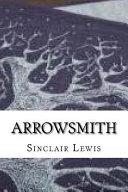Quotes from book
Arrowsmith

Arrowsmith is a novel by American author Sinclair Lewis, first published in 1925. It won the 1926 Pulitzer Prize . Lewis was greatly assisted in its preparation by science writer Paul de Kruif, who received 25% of the royalties on sales, although Lewis was listed as the sole author. Arrowsmith is an early major novel dealing with the culture of science. It was written in the period after the reforms of medical education flowing from the Flexner Report on Medical Education in the United States and Canada: A Report to the Carnegie Foundation for the Advancement of Teaching, 1910, which had called on medical schools in the United States to adhere to mainstream science in their teaching and research.

“Like all ardent agnostics, Martin was a religious man.”
Arrowsmith (1925), Ch. 16

Arrowsmith (1925)
Context: Perhaps I am a crank, Martin. There are many who hate me. There are plots against me—oh, you t'ink I imagine it, but you shall see! I make many mistakes. But one thing I keep always pure: the religion of a scientist.
To be a scientist—it is not just a different job, so that a man should choose between being a scientist and being an explorer or a bond-salesman or a physician or a king or a farmer. It is a tangle of ver-y obscure emotions, like mysticism, or wanting to write poetry; it makes its victim all different from the good normal man. The normal man, he does not care much what he does except that he should eat and sleep and make love. But the scientist is intensely religious—he is so religious that he will not accept quarter-truths, because they are an insult to his faith.
He wants that everything should be subject to inexorable laws. He is equal opposed to the capitalists who t'ink their silly money-grabbing is a system, and to liberals who t'ink man is not a fighting animal; he takes both the American booster and the European aristocrat, and he ignores all their blithering. Ignores it! All of it! He hates the preachers who talk their fables, but he iss not too kindly to the anthropologists and historians who can only make guesses, yet they have the nerf to call themselves scientists! Oh, yes, he is a man that all nice good-natured people should naturally hate! ~ Gottlieb, Ch. 26

Arrowsmith (1925)
Context: Perhaps I am a crank, Martin. There are many who hate me. There are plots against me—oh, you t'ink I imagine it, but you shall see! I make many mistakes. But one thing I keep always pure: the religion of a scientist.
To be a scientist—it is not just a different job, so that a man should choose between being a scientist and being an explorer or a bond-salesman or a physician or a king or a farmer. It is a tangle of ver-y obscure emotions, like mysticism, or wanting to write poetry; it makes its victim all different from the good normal man. The normal man, he does not care much what he does except that he should eat and sleep and make love. But the scientist is intensely religious—he is so religious that he will not accept quarter-truths, because they are an insult to his faith.
He wants that everything should be subject to inexorable laws. He is equal opposed to the capitalists who t'ink their silly money-grabbing is a system, and to liberals who t'ink man is not a fighting animal; he takes both the American booster and the European aristocrat, and he ignores all their blithering. Ignores it! All of it! He hates the preachers who talk their fables, but he iss not too kindly to the anthropologists and historians who can only make guesses, yet they have the nerf to call themselves scientists! Oh, yes, he is a man that all nice good-natured people should naturally hate! ~ Gottlieb, Ch. 26

“There was much conversation, most of which sounded like the rest of it.”
Arrowsmith (1925), Ch. 14